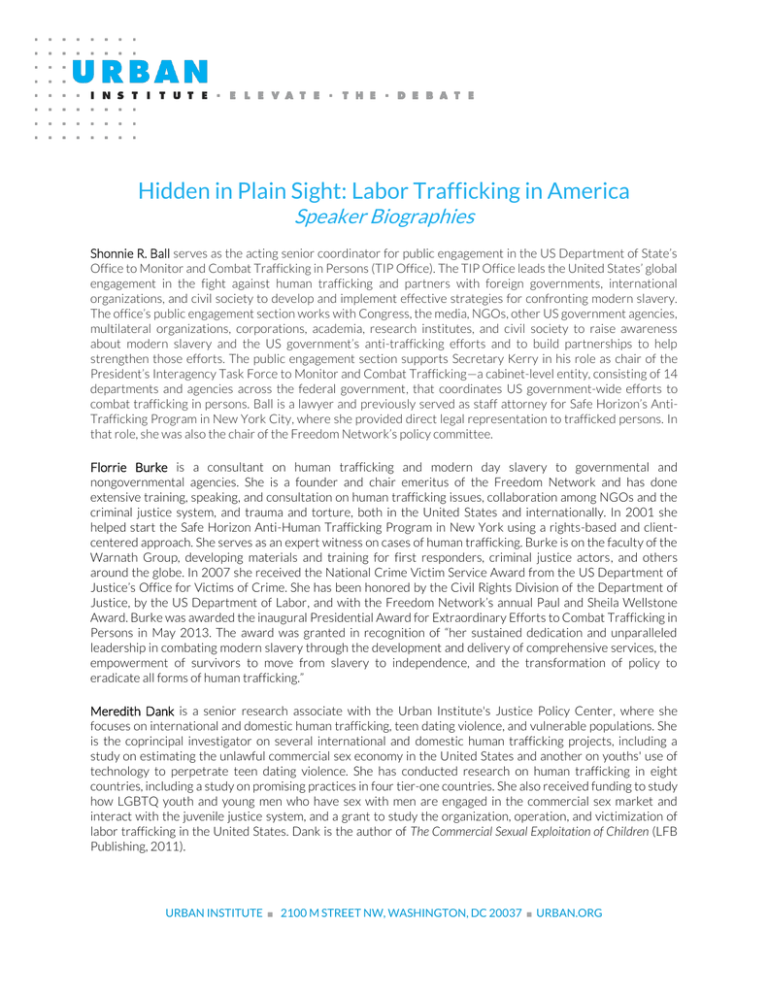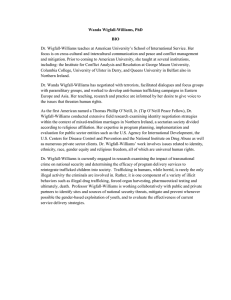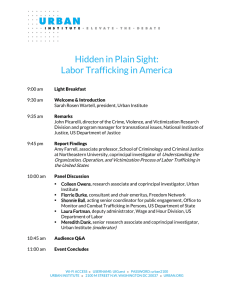
Hidden in Plain Sight: Labor Trafficking in America
Speaker Biographies
Shonnie R. Ball serves as the acting senior coordinator for public engagement in the US Department of State’s
Office to Monitor and Combat Trafficking in Persons (TIP Office). The TIP Office leads the United States’ global
engagement in the fight against human trafficking and partners with foreign governments, international
organizations, and civil society to develop and implement effective strategies for confronting modern slavery.
The office’s public engagement section works with Congress, the media, NGOs, other US government agencies,
multilateral organizations, corporations, academia, research institutes, and civil society to raise awareness
about modern slavery and the US government’s anti-trafficking efforts and to build partnerships to help
strengthen those efforts. The public engagement section supports Secretary Kerry in his role as chair of the
President’s Interagency Task Force to Monitor and Combat Trafficking—a cabinet-level entity, consisting of 14
departments and agencies across the federal government, that coordinates US government-wide efforts to
combat trafficking in persons. Ball is a lawyer and previously served as staff attorney for Safe Horizon’s AntiTrafficking Program in New York City, where she provided direct legal representation to trafficked persons. In
that role, she was also the chair of the Freedom Network’s policy committee.
Florrie Burke is a consultant on human trafficking and modern day slavery to governmental and
nongovernmental agencies. She is a founder and chair emeritus of the Freedom Network and has done
extensive training, speaking, and consultation on human trafficking issues, collaboration among NGOs and the
criminal justice system, and trauma and torture, both in the United States and internationally. In 2001 she
helped start the Safe Horizon Anti-Human Trafficking Program in New York using a rights-based and clientcentered approach. She serves as an expert witness on cases of human trafficking. Burke is on the faculty of the
Warnath Group, developing materials and training for first responders, criminal justice actors, and others
around the globe. In 2007 she received the National Crime Victim Service Award from the US Department of
Justice’s Office for Victims of Crime. She has been honored by the Civil Rights Division of the Department of
Justice, by the US Department of Labor, and with the Freedom Network’s annual Paul and Sheila Wellstone
Award. Burke was awarded the inaugural Presidential Award for Extraordinary Efforts to Combat Trafficking in
Persons in May 2013. The award was granted in recognition of “her sustained dedication and unparalleled
leadership in combating modern slavery through the development and delivery of comprehensive services, the
empowerment of survivors to move from slavery to independence, and the transformation of policy to
eradicate all forms of human trafficking.”
Meredith Dank is a senior research associate with the Urban Institute's Justice Policy Center, where she
focuses on international and domestic human trafficking, teen dating violence, and vulnerable populations. She
is the coprincipal investigator on several international and domestic human trafficking projects, including a
study on estimating the unlawful commercial sex economy in the United States and another on youths' use of
technology to perpetrate teen dating violence. She has conducted research on human trafficking in eight
countries, including a study on promising practices in four tier-one countries. She also received funding to study
how LGBTQ youth and young men who have sex with men are engaged in the commercial sex market and
interact with the juvenile justice system, and a grant to study the organization, operation, and victimization of
labor trafficking in the United States. Dank is the author of The Commercial Sexual Exploitation of Children (LFB
Publishing, 2011).
URBAN INSTITUTE
2100 M STREET NW,
WASHINGTON, DC 20037
URBAN.ORG
Amy Farrell is an associate professor of criminology and criminal justice at Northeastern University. Her
scholarship seeks to understand arrest, adjudication, and criminal case disposition practices. Over the past few
years, Farrell has focused much of her attention on understanding how the criminal justice system responds to
the newly prioritized crime of human trafficking. In support of this research, she oversees a program to collect
data on human trafficking investigations for the US Department of Justice. She has studied and published
research about how local, state, and federal law enforcement agencies identify, investigate, and prosecute
human trafficking cases. She recently completed a project examining labor trafficking victimization based on
data from victim service providers, police, and victims themselves in four cities across the United States. Farrell
is also engaged in ongoing research examining how changes in state human trafficking laws affect the
identification and prosecution of human trafficking offenders. Farrell has testified about police identification of
human trafficking before the US House of Representatives Judiciary Committee. She is also a gubernatorial
appointee to the Massachusetts Attorney General’s Human Trafficking Policy Task Force. In 2006, Farrell was
a corecipient of the National Institute of Justice’s W. E. B. Du Bois Fellowship on crime justice and culture.
Laura Fortman joined the US Department of Labor as the deputy administrator for the Wage and Hour
Division in June of 2013. Before this appointment, Fortman served as the executive director of the Frances
Perkins Center (Newcastle, Maine), an organization dedicated to achieving social justice and the fair treatment
of workers. Previously she spent almost eight years as the commissioner of labor for Maine. Fortman has made
a career of advocating for social and economic justice. She spent the early part of her career providing services
and programs to victims and survivors affected by sexual violence at the Sexual Assault Crisis and Support
Center (Winthrop, Maine), where she served as the executive director for five years. She has also served as the
executive director of the Maine Women’s Lobby and the Maine Women’s Policy Center, and as the chair of the
Joint Enforcement Task Force on Employee Misclassification. Her many leadership positions also include
service on the board of directors for the National Employment Law Project, chair of the Maine governor’s
Workforce Cabinet, and member of the National Association of State Workforce Agencies. Her long career in
advocacy, legislation, and education has led to improvements in work-life quality and empowerment of the
most vulnerable.
Colleen Owens is a research associate with the Urban Institute's Justice Policy Center, where she directs
several national and international research projects on human trafficking, spanning eight countries and five
continents. She currently serves as coprincipal investigator leading a National Institute of Justice (NIJ)-funded
study to examine forced marriage in the United States. She was coprinicpal investigator of a study on the
organization, operation, and victimization process of labor trafficking in the United States. She is also
coprincipal investigator for three US Department of State-funded projects including a project identifying
promising practices in anti-trafficking prosecution, prevention, protection, and partnership in four tier-one
countries. Owens served as Urban Institute project director for an NIJ-funded study with Northeastern
University to examine challenges in the investigation and prosecution of state and local cases of human
trafficking in twelve counties in the United States. She served as the Urban Institute project director of the
national Human Trafficking Reporting System, a joint project with Northeastern University, to design and
operate the first national data collection and reporting system on human trafficking victims and offenders in
the United States. Owens was also involved in an NIJ-funded study to estimate the size of the unlawful
commercial sex economy in the United States. She has conducted evaluability assessments of anti-trafficking
programs in Africa and Asia and conducted research on federal prosecutions of the commercial sexual
exploitation of children in the United States .
URBAN INSTITUTE
2100 M STREET NW,
WASHINGTON, DC 20037
URBAN.ORG
John T. Picarelli serves two roles for the National Institute of Justice (NIJ). As a division director, Picarelli
oversees NIJ’s experts addressing violence and victimization in their research portfolios. The Violence and
Victimization Research Division explores such topics as violence against women, elder abuse, children exposed
to violence, bias crimes, and tribal justice. As the program manager for transnational issues, Picarelli oversees
investments in research and evaluation projects that examine how transnational organized crime, human
trafficking, and terrorism affect the US criminal justice community. Since 2008, Picarelli has built the program
by revitalizing its research on transnational organized crime, expanding its human trafficking portfolio, and
founding a new program on domestic radicalization and violent extremism. He has published over two dozen
journal articles and book chapters. Picarelli also teaches graduate and undergraduate courses at George
Washington University. He received his PhD in international relations from American University.
URBAN INSTITUTE
2100 M STREET NW,
WASHINGTON, DC 20037
URBAN.ORG






